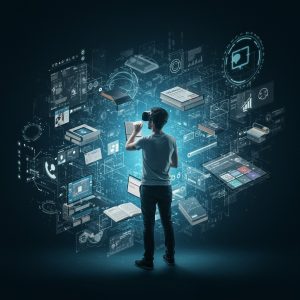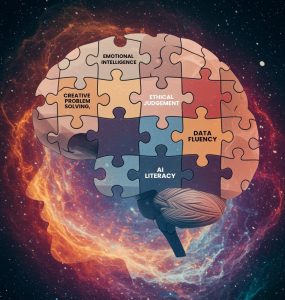Secure Your Career’s Future, In a world where AI appears to be transforming jobs quicker than we can refresh our LinkedIn profiles, numerous individuals are posing the same inquiry: How can I remain relevant? As an individual who has been observing the overlap of technology and employment, we’ve witnessed both the alarm (“The machines are taking our jobs!”) and the casual dismissal (“We’ve navigated technological revolutions in the past”). The reality, as usual, exists somewhere in the middle. Therefore, do not lose your composure, stay in charge.

Secure Your Career’s Future: Acquire these essential skills to remain competitive in the age of AI :The Updated Face of Employment
Let’s be honest the work environment is changing right in front of us. The statement from the Anthropic CEO that AI will write “almost all code” in a year may be exaggerated, yet it highlights a larger reality: AI is fundamentally transforming the nature of work.
Recent data from LinkedIn shows the extent of this transformation: by 2030, an astonishing 70% of the skills required in most occupations will shift. For companies, this signifies adopting skills-focused recruitment methods, potentially increasing talent pools by 6.1 times worldwide.
However, the positive aspect is that historical evidence indicates technological revolutions generally generate more employment opportunities than they remove. The essential point is that these are distinct roles that demand varied skills. The issue isn’t if there will be jobs for people – it’s about the type of work and the skills required to perform it.
The Human Edge: What AI Cannot (As Of Now) Substitute
Although remarkable progress has been made, AI continues to face challenges in areas that are distinctly human:
1. Emotional Intelligence (EQ)
AI can assess sentiment, but it cannot genuinely empathize. Positions that necessitate profoud emotional insight ranging from leadership and counseling to customer experience design – continue to gain significantly from human interaction. The skill to interpret a situation, detect underlying tensions, or create authentic connections is still the domain of humans.
As organizations undergo intricate transformations and teams encounter uncertainty, individuals who can handle emotions – both personally and in others – become essential. Emotional intelligence isn’t merely a luxury; it’s increasingly vital for career resilience and advancement.
Take Yale’s free Science of Well-Being course (https://online.yale.edu/courses/science-well-being)
2. Creative Problem-Solving
Although AI is proficient at addressing clearly defined technical issues, it finds it difficult to utilize the lateral thinking that humans instinctively use when encountering new challenges. The capability to link apparently unrelated ideas, challenge fundamental beliefs, and conceivegenuinely groundbreaking solutions remains a human superpower to this day.
In a business environment where disruption is constant, employers increasingly value those who can approach problems from unexpected angles and pioneer entirely new solutions. It’s no surprise that “Creativity and Innovation” tops LinkedIn’s 2025 list of fastest-growing skills in India by the IndianExpress.com, with professionals across higher education, technology, and IT sectors prioritizing this capability.
3. Ethical Judgment
AI systems can adhere to coded ethics, yet they find it challenging to handle the subtle moral reasoning that comes easily to humans. As AI increasingly embeds itself in critical areas—ranging from healthcare to criminal justice to finance individuals who can manage intricate ethical challenges and guarantee that technologies reflect human values become indispensable.
The expanding domain of AI ethics and governance provides new job opportunities for individuals who can connect technical knowledge with ethical judgment.

Critical Skills for the AI Age
Beyond these inherent human advantages, LinkedIn’s “Skills on the Rise 2025” report for India highlights specific capabilities becoming increasingly valuable in our AI-transformed economy:
1. AI Literacy
You don’t need to become a expert in machine learning, but understanding AI’s capabilities, limitations, and appropriate applications is becoming as fundamental as computer literacy was a generation ago. This means knowing enough to:
• Identify tasks AI can effectively automate
• Spot potential biases or weaknesses in AI systems
• Effectively collaborate with AI tools
• Ask the right questions when AI solutions are proposed
Organizations increasingly need “translators” who can bridge the gap between technical AI teams and business users. LinkedIn ranks “AI Literacy” as the 9th fastest-growing skill in India, with software engineers, data analysts, and data scientists leading adoption across IT services, technology, and higher education sectors.
Google’s AI Essentials (4-hour course)
IBM’s AI Foundations on Coursera
2. Data Fluency
AI runs on data, making data literacy increasingly valuable across virtually all roles. This includes:
• Understanding how data is collected and its limitations
• Interpreting data visualizations critically
• Recognizing when correlation is being confused with causation
• Communicating data-driven insights effectively to non-technical audiences
Even if you’re not a data scientist, comfort working with and communicating about data significantly enhances your value in an AI-powered workplace. “Statistical Data Analysis” ranks 12th on LinkedIn’s list, with data analysts and software engineers leading adoption of these skills.
3. Adaptability and Continuous Learning
Perhaps the most important skill is the ability to keep learning as technology and requirements evolve. The half-life of professional skills continues to shrink – what you learned in school or early career may become obsolete faster than ever before.
Cultivating learning agility – the ability to quickly develop new skills and apply them effectively – has become essential. This means:
• Staying curious about emerging technologies
• Developing effective personal learning strategies
• Building learning networks that expose you to diverse perspectives
• Embracing a growth mindset that sees challenges as opportunities
LinkedIn ranks “Adaptability” as the 7th fastest-growing skill in India, particularly valued among software engineers, HR specialists, and teachers across IT, technology, and business consulting sectors.

Emerging Technical Skills
LinkedIn’s data highlights several technical skills experiencing rapid growth:
1. LLMs, or large language models
As businesses incorporate AI into their processes, LLM expertise is becoming more and more in demand, ranking eighth on LinkedIn’s list. This capacity makes software engineers, data scientists, and AI engineers highly sought after in the higher education, IT services, and technology sectors.
2. Prompt Engineering
Prompt technical knowledge (ranked 13th) has become essential for improving automated replies and optimizing user interactions as AI-driven chatbots and virtual assistants spread throughout industries. An excellent illustration of how AI is generating completely new job categories is this relatively young industry.
3. Code review and debugging
Debugging (10th) and code review (2nd) abilities are now crucial for preserving quality, guaranteeing security, and promoting collaborative learning in software development due to the growing complexity of software and the potential for cybersecurity risks.
Strategic and Communication Skills
The AI era places even greater emphasis on higher-order strategic and interpersonal skills:
1. Strategic Thinking
Ranked 5th on LinkedIn’s list, the ability to anticipate future challenges, identify opportunities, and align resources for long-term success has become vital in an era of market volatility and rapid change.
2. Communication
Clear communication (ranked 6th) ensures effective collaboration and maintains productivity, especially as teams become more diverse and flexible work arrangements become standard.
3. Problem Solving
The 3rd-ranked skill on LinkedIn’s list, problem-solving ability helps professionals navigate uncertainties and drive growth amid technological disruption and changing market conditions.

Practical Strategies for Skill Development
There is a crucial need to learn these AI skills in order to thrive in this upcoming AI economy? Here are some actionable approaches:
But how can we really build these vital skills? Here are a few practical methods:
1. Hands-on Exploration
Learn to use different AI Tools. Use ChatGPT, Claude, or other easy-to-access AI systems to understand what they’re good at and where they fall short, become very good at handling the AI tools. Check out tools specific to your field. Constant learning will always keep you ahead in the race.
2. Mixing Skills
Look for ways to blend your expertise with the AI, This is what everyone needs to do. For example, if you’re in marketing, explore how AI helps optimize content or segment audiences. In healthcare? Look into AI applications for planning treatments or making diagnoses. In Software? Look how you use AI in order to increase the productivity and get codes at the faster rate.
3. Human-Centred Design Approach
Design thinking, with its emphasis on understanding others coming up with ideas, and making improvements, gives us a solid approach to work with AI. Learning how to build systems that take advantage of what both people and AI do best will become more and more important. Many companies have already implemented these ideas.
4. Ethical Reasoning
Learn and improve your skills to spot and handle moral problems. Try getting into practical ethics classes or joining talks about responsible AI growth. Being able to see ethical issues before they turn into big problems will make you stand out. This will make the world a better place to live.
The Mindset Shift.
Changing our perspective from one of competition to one of cooperation with AI is perhaps the most crucial change. The most prosperous professionals in the AI future will be those that compete with machines rather than against them, using AI to complete repetitive jobs while concentrating their human talents on more difficult problems.
In conclusion
The AI revolution is slowly taking over the world and it’s reshaping the scene of crucial skills instead of signalling the demise of human jobs. We can build careers that team up with AI rather than oppose it by sharpening our emotional smarts, thinking out of the box and innovation will always keep you ahead in the AI race.
The future belongs to those who welcome change and work on it, not those who dread it. By growing the talents that showcase our unique human traits while gaining knowledge in AI and data, we can succeed in the new economy – collaborating with the AI systems to tackle meaningful issues so that we can lower our work burden.
Keep in mind: Each tech breakthrough has generated more chances than it wiped out. The trick is to set ourselves up to grab these chances as they pop up..
FAQs
1. What’s the main point of the article?
The article aims to help new software engineering graduates get ready for a career in the AI age. It will help the upcoming graduates to thrive in the software engineering jobs and stresses the need to grow both people skills and tech knowledge. It also highlights smart ways to stay competitive and useful in this changing scene.
2. What are the key human skills mentioned in the article?
Three essential human skills for software engineers are highlighted in the article:
• Effective teamwork, client relationship management, and leadership in remote or hybrid work environments all depend on emotional intelligence.
• Creative Problem-Solving: Crucial for tackling particular difficulties and developing beyond AI’s potential.
• Ethical judgment: essential for managing ethically complex AI issues, such as guaranteeing software security, privacy, and fairness.
3. What technical skills are highlighted as important for software engineers in the AI era?
The essential technical skills listed in the article are:
Understanding AI’s capabilities, limitations, and applications in software development is known as AI literacy.
* Data Fluency: The capacity to evaluate data, identify its limitations, and effectively communicate insights.
* Flexibility and Technical Education: Staying up to date with emerging technologies and AI tools as it highlights the growing relevance of cutting-edge abilities like prompt engineering and large language models (LLM).
4. How can software engineering graduates develop these skills?
Graduates can develop these abilities by focusing on their learning curves by making deliberate and useful efforts:
* Practical Investigation with AI Tools: Examining how AI fits into coding processes by utilizing programs like ChatGPT or GitHub Copilot.
* Hybrid skill development: combining traditional software engineering techniques with AI expertise, such as applying machine learning to testing or debugging. In order to create software that is easy to use, human-centered design thinking
emphasizes empathy and iteration.
* Ethical Reasoning: To effectively address ethical issues, participate in discussions or courses about responsible AI._
5. What is the mindset shift recommended in the article?
According to the article, graduates should see AI as a partner rather than a competitor. Engineers can focus on higher-value work, like solving complex problems, out of the box thinking, fostering innovation, and making moral decisions, by using AI to handle repetitive tasks like writing boilerplate code. This will lead to a more fulfilling career in the AI-driven world. Moreover AI is not a threat, it is way to enhance your productivity at work.




